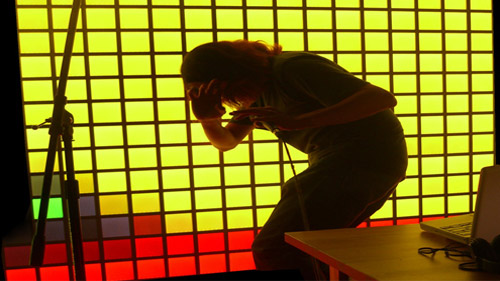
Beat – A magazine covering Creative Commons Music Culture
After years of working as an music journalist I am still surprised how the print music media ignore the world of free music. Creative Commons Musicians nearly get no support by print magazines which write about music. Netlabels get no spot, even if they try. The only print media which cover creative commons topics are newspapers and live style magazines. Only one exception proves the rule: A German magazine called Beat writing about synthesizers, music production and… yes, Creative Commons Music. We interviewed its driving force aka main editor aka Thomas Raukamp.
Thomas, please introduce yourself! How did you get main editor of Beat and where are your roots?
First of all, let me thank you for the privilege of being interviewed by one of my favorite online magazines out there. Phlow has been a big inspiration for me over the last couple of years and you’re doing a fantastic job.
I came to journalism through my enthusiam for Atari computers back in the 1990s, which lead me to writing for “st-computer”, the last remaining print magazine in the German Atari market at that time. As you can imagine, I used the Atari for making music, as it was the no. 1 music machine back then. So I always had a passion for music and especially all kinds of electronic styles. To make a long story short, I always tried to combine my interests for technology and music, which prepared me for music journalism in the field of electronic music, I guess.
When was your first contact to free music and creative commons music in general?
My first contact with free music was back in the days when members of the Amiga and Atari demo scene exchanged the music they generated with trackers on their machines via mailboxes, forums and early versions of the web. Later the original MP3.com was the first online service that made me realize the potential of the net to distribute free music without the creative limitations of the mainstream music industry, which I learned to hate more with every passing year.
Granted, a lot of stuff that was released on MP3.com back then could cause severe earache compared to today’s standards of recording, but it was that unbiased approach to write, produce and distribute your own music, that made those early music communities so charming - looking back it was kind of anarchic. On the other hand, I still follow amazing bands I firstly discovered on MP3.com, like the amazing Electrostatic. Must have been around 2004/2005 when I stumbled upon the first netlabel I discovered, and it was the fantastic iD.EOLOGY, which I still admire.
With its first issue in 2005 Beat introduced surprisingly Brigitte Bijoux as MP3 Music Artist of the month. Since then you kept an eye on free music on the web and increased your energy to cover the creative commons scene. Why?
In my opinion you’ll find the most relevant music that is produced today in the netaudio or netlabel scene, just because it is not driven by commercial interests and is amazingly close to the bone. This may sound quite romantic and even odd to some, but for the vast majority of netlabels, it still is the case and will forever be. The netaudio scene has already changed the process of distributing your own music - and it has the power to continue to do that.
Computers, tools like Ableton Live and VST-Plug-ins have emancipated nowadays’ musicians from expensive recording studios and time with producers, and the netaudio scene is just the next logical step, as it emancipates them from the traditional kinds of distribution via record companies and their creative restraints. Combine that with the power of the web to distribute trends faster than any other medium out there, and you’ll have the most authentic look at today’s music. How could we as magazine, which claims to stay close to the musical pulse as well as to the people out there who actually produce music here and now, ignore that?
Why do you think ignore music print media the world free music and musicians? Is it only because netlabels don’t advertise in print magazines or is there maybe another reason?
It would be too blue-eyed, if I said that wouldn’t be part of the problem, right? But on the other hand, most of the ambitious music magazines out there also cover releases from independent record labels that don’t have the money to advertise as well - just because at least the labels that take their job seriously send out demos and cds.
This is still a significant problem in the netlabel scene to be honest - most people who run a netlabel forget that their work should start right there where the average netlabel head thinks it stops, they forget to promote their artists’ work. Putting a release on a webseite and getting out some notes about it within the scene’s blogs and forums or on Twitter and Facebook should just be the beginning of getting the word out.
If you want coverage in relevant magazines, print or online, you should at least send them an email or even better an email and a cd with some nice artwork they’ll remember so you have to do the first step. Or give them a call to tell them you just released some excellent music on your label they should listen to. To a journalist, it won’t matter if you are a traditional label or a netlabel, they just care about the quality of the music you put out. If they find out that it is yet free, they’ll love it even more. Plus, netlabels should organize events and release parties on which they showcase their acts, or they should even organize and promote tours with them. Music journalists still happen to run into concerts and parties ;)
I should add there are already some netlabels out there which do a great job in promoting their artists, like the wonderful aaahh-records. And they’re very successful: “Entertainment For The Braindead” didn’t just go down like a storm within the scene, it also received some attention by regular media. Same with rec72 and Zoe.Leela’s “Queendom Come”.
To be fair, I must admit it is certainly also music journalism’s own fault to ignore a scene that keeps some of the most precious gems of today’s music scene. Journalists tend to be lazy, and they would have to dig a little deeper than they’re used to in order to find them.
Nowadays musicians - especially electronic musicians - get lots of incredible music software for free. Next to freeware vst plugins you also find user-friendly music software on mobile phones like a lot of incredible apps for the iphone for example. Do you think free music software could endanger some day in the near future magazines like Beat, because all the tools you need wait to be downloaded for free? Could it be possible that something similiar might happen to print magazines dealing with music software and music devices like the death of the old music industry? What happens if suddenly mobil phones morph into music machines and so on?
You’ll never know ;) In my personal opinion a print magazine has to return to what it does best: delivering in-depth information. So coverage in a print magazine has to be vertical, not horizontal. And the worst idea to me is to try to imitate online magazines in a print magazine or compete with them in their ancestral strongholds.
A print magazine is a print magazine is a print magazine, right? And this is what people expect from it. They already pick up the latest news and tools from the internet, they don’t need a print magazine to do that for them. A print magazine does a good job, if people love to take it with them to their favorite armchair or to bed and actually read in it and say “I didn’t know that before” when they finished an article of their interest. There still is an sincere interest in in-depth information, and the web still isn’t the right ambience for that - which might change in the near future with new tools and technical gizmos by companies like Apple and their new tablet whatever. So I guess we’ll have to answer these questions again in two years time or so.
Please tell us your Top-5 Creative Commons Songs, Top-5 Creative Commons music album and Top-5 netlabels you won’t miss anymore.
This is a tough one, I keep asking that myself every day. ;) So here are my Top 5 netlabels for this day in no particular order:
It’s even tougher to name my favorite CC-albums, there’s so much wonderful stuff out there - so this is also a mere snapshot:
- Sky Barstow - “It’s Circular” (Phlow Review)
- Adamned.Age - “Tard Dans La Nuit”
- Fjordne - “Light Passed On Through The Layer”
- Black Era - “Third Eye Guerilla” (Phlow Review)
- Erdbeerschnitzel - “Vorsprung durch Hektik”
- Rupert Falsch - “Links auf der Fahrbahn, ein totes Tier”
It’s impossible for me to name my favorite CC-songs, I think I tend towards being an album lover. Sorry!



